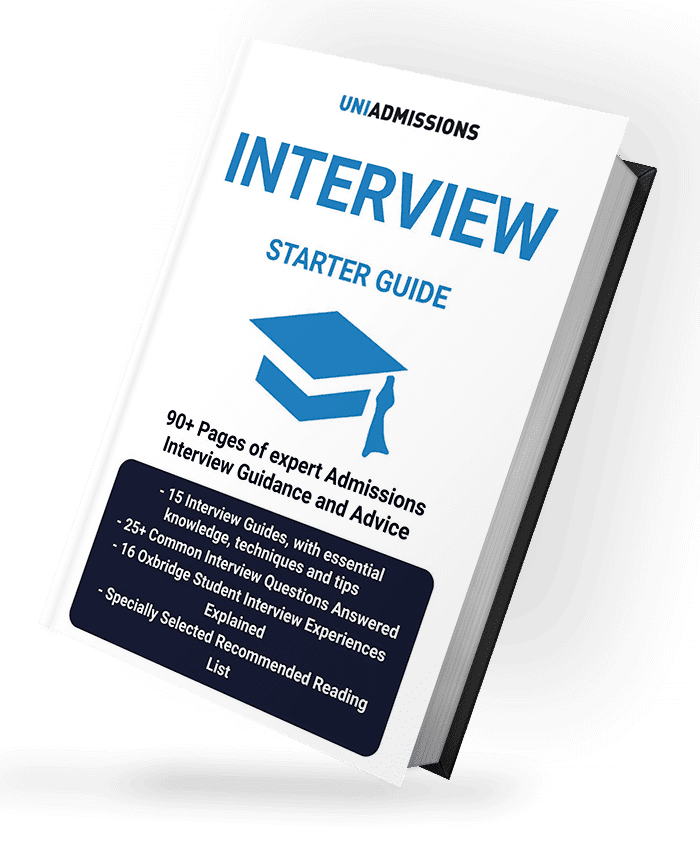An Oxford medical Interview is different to an Interview at most other medical schools. However, this doesn’t mean that you can’t be properly prepared.
Oxford medical Interviews typically last around 20 minutes, and all candidates will have at least 4 of them. It is perhaps better to describe it as an academic discussion than an Interview in the typical sense.
While there may be some questions like ‘what makes you a good student’ etc, which are ice-breaker questions to make the applicant more comfortable, the majority of the Interview will be focused on challenging questions and academic potential.
A number of Oxford medical Interview questions come up time and time again; be prepared and find out how best to answer them. First, we will look at what the interviewers are looking for and then we will explore how to answer the more common Oxford medical questions.
With only 23% of the highest performing Oxford Medicine applicants getting invites, it is crucial you stand out from them. We help you demonstrate your passion, interest and experience and ace your Interview.
With over 95 hours of guided study (including One-To-One Tuition, Intensive Courses and Comprehensive Materials), our expert Oxford Medicine Interview support truly gives you an advantage that can make the difference between an offer and rejection.
Discover our Oxbridge Medicine Interview Programme by clicking the button below to enrol and triple your chances of success.
What are they looking for in an Oxford Interview?
Unlike Interviews at other universities, Oxford Interviews are far more focused on academic capability. Whilst there will be Oxford medical Interview questions that examine your skills in empathy, communication skills, and other ‘softer skills, most of the questions are designed to see how you think.
The medical tutors use the Interviews to find if candidates will be suitable for learning in the focused tutorial environment that Oxford is famous for. Tutorials require a high level of academic insight and development of ideas, so you can expect the Oxford medical Interview questions to test you on these.
It can be difficult to know how to act in an Interview. The official criteria that Oxford University state they look for in a candidate is listed as follows:
The image above shows the key qualities that Oxford look for in their Medicine Students. Make sure you are prepared to demonstrate how you meet these qualities and use evidence form your work experience or other examples.
Ultimately, if you can develop your thought process using logical assumptions and applied knowledge to arrive at a sensible answer, this will stand you in good stead for being accepted onto the course. This is a hard skill to develop, but through practice, you can make significant progress to boost your chances of success.
To get a better idea about how to do well, particularly with the difficult Oxford medical Interview questions, we need to look more closely at the types of questions that applicants need to be prepared for. This will give applicants a better idea of what to expect, and help them to prepare for questions rather than be caught off guard by each one. Read on to go through the different question types.
Download our FREE 90-Page Interview Starter Guide
Our 90-page E-Book is filled with expert Interview Advice, common interview questions and first-hand interview experiences from successful Oxbridge applicants.
To access all this for free, just enter your name and email address and you’ll be sent the guide directly to your inbox.

Oxford Medical Interview Questions
You are likely to be faced with questions to which there is no immediately obvious answer. It’s important to remember that you aren’t expected to know all the answers to these questions. They are designed to give you the opportunity to think aloud and demonstrate to the tutors how you approach an academic challenge.
As your answer develops, the tutors will challenge your emerging narrative, giving you the chance to adapt your answer as it develops. Therefore, when practising, make sure you practice your thinking out loud in preparation for the Interview.
Also, as a general rule, tutors are likely to ask questions about their own areas of expertise. Therefore, doing some online research prior to an Interview is always a good idea, as the college should tell you the names on the Interview panels.
However, the tutors often work in some complex and specialised fields that you are unlikely to be able to do much background research on. Especially with the level of scientific understanding that you have at this moment in time. This is to be expected, so don’t get too hung up on reading the tutor’s latest research; you aren’t going to get a real understanding.
While the questions in a medical Interview could be on anything, they can be broadly grouped into a few categories. The following list aims to show you the overarching styles of questions that could be asked, and how to best approach them:
Factual
These Oxford Medicine Interview questions test the applicants’ direct knowledge of the subject. They will not be a large part of the Interview process, and will not draw on more than A-Level Biology and Chemistry knowledge unless you have mentioned a specific topic in your Personal Statement.
Candidates should make sure that they have a solid understanding of anything they have written about, and can still tackle the types of questions they might have had at schools like mole calculations or the functions of specific organs or systems of the body.
- Why do we have red blood cells?
- Why does heart rate increase with exercise?
- What does your liver do?
- Which is your most important organ?
Ethical
These questions test the applicant’s suitability for the role of a doctor and introduce them to some of the dilemmas that are common in modern medicine. They will often involve introducing a difficult scenario and asking what the most ethical course of action is.
- Should the NHS treat smokers for free?
- Is the health of a child more important than the health of an adult?
- How should justice be incorporated into Medical practice?
Logical/Creative
There may well be questions that have nothing to do with medicine that test the student’s creative thought processes and ability to think outside the box in a stressful situation. While some of these questions may seem bizarre, it is always best to try to answer them and not be afraid to ask for help if really stuck.
- If you threw a stone out of a boat on a lake and into the water, what would happen to the water level?
- How do animals know when to migrate?
Methodical
Some questions may test the student’s ability to come up with creative solutions in a similar way to the abstract logical/creative questions, but with a more direct link to medicine. These require careful thought, and consideration of all factors present in the possible solutions.
- How would you find out the weight of all the blood in a living person?
- What approach would you take to testing for dangerous allergic reactions in a patient?
Analytical
Many of these questions will be based on unseen material. As with Interviews for other subjects at Oxford, the applicant may be given images, graphs, texts, or objects to analyse and discuss in their Interview. Again, it is important to think carefully before coming to any conclusions but to not be afraid to try to answer the question, even if you do not know the answer (the whole point may well be that they do not know the answer!).
- A student may be given a skull and asked what kind of animal it is from, and why it is like it is.
- A student could be asked to interpret a graph on the obesity rates from a particular time and place.
Final comments
This should, of course, be taken as a rough guide to the Oxford Medicine Interview questions (everyone has a different experience). Just remember that successful applicants make their thought processes clear, and are not afraid to approach difficult questions from creative angles!
It can be a very stressful experience with a lot of pressure, but you should remember to relax and show off your ability to deal with brand new situations. You will not be expected to know everything already, but successful applicants will certainly show a keenness to learn, and a creative and logical approach to challenges.
Worried about how you will score in the Oxford Medicine Interview? Our Tuition and Mock Interviews will guide you through the toughest questions.
Our Oxbridge Medicine Interview Programme is designed to give you the highest chance of a Medicine offer at the Interview stage. Your expert Oxbridge tutor will work with you based on your specific subject and personal circumstances to craft a strong Interview strategy that truly gives you an advantage that can make the difference between an offer and rejection.
Discover our Oxbridge Medicine Interview Programme by clicking the button below to enrol and triple your chances of success.









